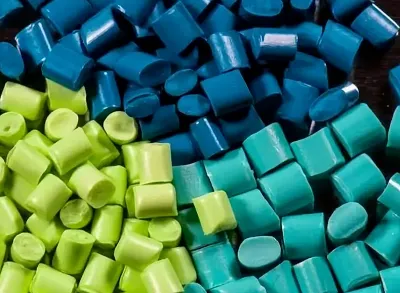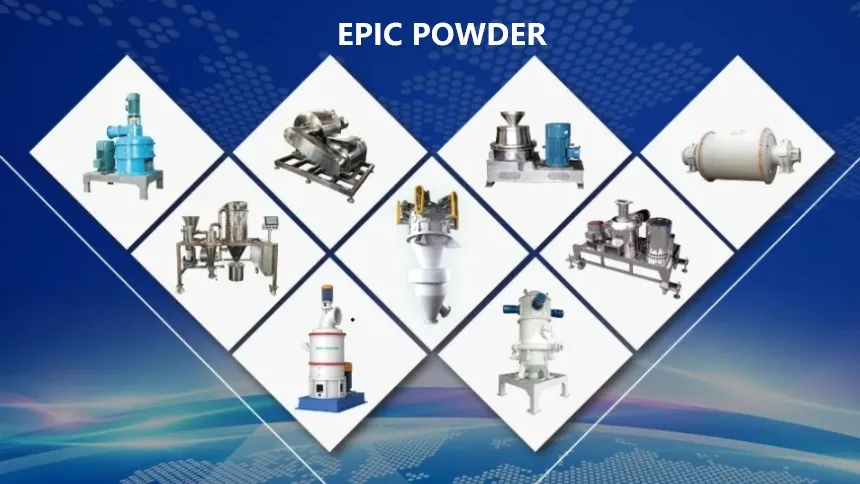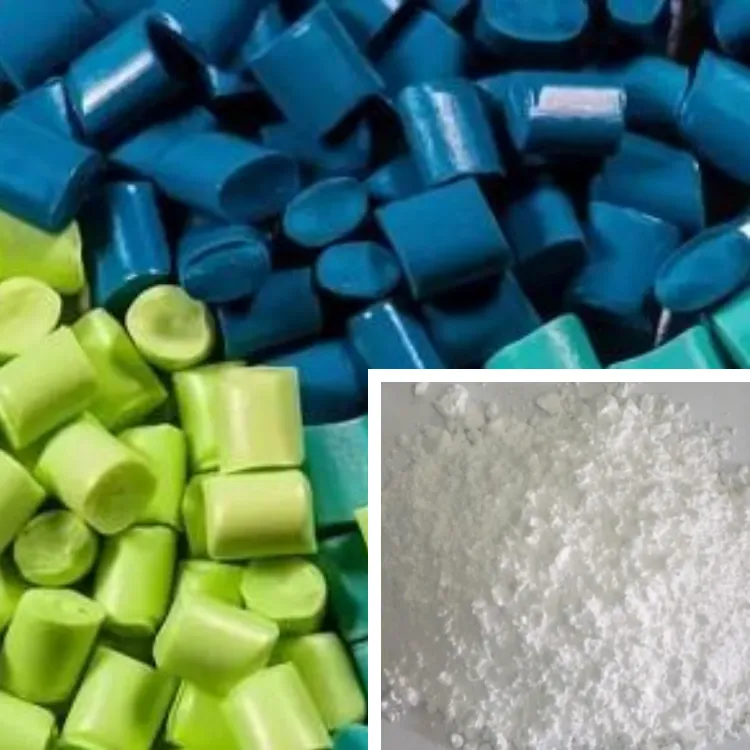Calcium carbonate (CaCO₃) is a common inorganic compound. In nature, calcium carbonate exists in many forms, such as calcite, limestone, marble, etc. It is the main component of many rocks and minerals. From a chemical point of view, calcium carbonate decomposes into calcium oxide (CaO) and carbon dioxide (CO₂) at high temperatures. It can react with acids to produce corresponding salts, carbon dioxide and water. So what role does calcium carbonate play in the plastics industry? What are its limitations?

Improve the strength and rigidity of plastic products
Calcium carbonate (CaCO₃) can be used to improve the mechanical properties of products, including rigidity, fracture resistance, tensile strength and impact strength. For example, using calcium carbonate as a reinforcing agent in the production of plastic film can improve its rigidity, significantly increase the stiffness of the film, and facilitate the flat curling of the film. For PBS, PLA, and PHA aliphatic polyester films, the addition of calcium carbonate can improve the degree of isotropy. It can also make up for its shortcomings of high longitudinal strength and low transverse strength. It significantly improves tear resistance.

Increase product stability
Improve dimensional stability:
In the processing of plastic products, internal stress may be generated due to uneven cooling or changes in processing conditions. Calcium carbonate has a low thermal expansion coefficient (3.0×10-6/℃) and low thermal conductivity, and has stable heat resistance. When added to plastics as a filler, it can play a role in skeleton support and reduce the overall thermal expansion coefficient of the composite material. Thereby reducing internal stress and dimensional changes caused by temperature changes, thereby improving dimensional stability. Generally speaking, the dimensional stability effect of calcium carbonate is greatly related to the morphology. Spherical fillers have excellent effects, while granular, flaky, and fibrous fillers are slightly inferior.
Improve heat resistance:
Some plastic products, such as PVC, have very poor thermal stability and cannot remain stable at high temperatures, and are prone to decomposition. Calcium carbonate can not only utilize its own good thermal stability, but also hinder the movement of organic molecular chains. As a result, the crystallization temperature of the composite material gradually increases, resulting in a decrease in crystallinity at high temperatures. Ultimately, the thermal stability of the composite material is significantly improved.
Improve surface properties
The surface tension of plastic film is one of its important physical properties. It directly affects the secondary processing processes such as ink printing, coating adhesion, and bonding with other materials.
Generally speaking, the size of the surface tension of plastic film depends on the size of the surface free energy. However, most plastic films such as polyolefin films (LDPE, HDPE, LLDPE, PP) are non-polar polymers. Their surface free energy is small, the surface wet tension is low, and the coating is not easy to adhere. The addition of calcium carbonate (CaCO₃) can improve the surface roughness, thereby increasing the surface tension of the composite material. And it gives excellent adsorption, so it can improve the coating and printing properties of the composite material.

As a pore former
Calcium carbonate (CaCO₃) particles can be added to the polymer matrix as a “porogen”. This composite material is cast or blown into a film, which is then stretched. This can cause interfacial peeling between the polymer matrix and the calcium carbonate particles to produce tiny holes (about 0.01 to 10um). This gives the film the function of being breathable and water-impermeable.

Improve environmental benefits
Smoke suppression effect:
CaCO3 can react with hydrogen halides in smoke to generate stable CaCl2, etc. Therefore, doping calcium carbonate in polymers such as vinyl chloride, chlorosulfonated polyethylene, and chloroprene rubber that produce hydrogen halides when burned can achieve a good smoke suppression effect. At the same time, the tiny holes formed by calcium carbonate in plastics can also increase the combustible area in contact with oxygen, which helps to promote more thorough incineration and reduce the release of black smoke. However, since the combustion reaction is a solid-gas heterogeneous reaction, it can only be carried out on the surface of solid particles. Therefore, the particle size of CaCO3 particles becomes an important factor in the smoke suppression effect. Only tiny particles have a much larger specific surface area. The finer the particle size of calcium carbonate, the better the smoke suppression effect.

Promote degradation:
When polyethylene plastic bags containing calcium carbonate are buried underground, calcium carbonate may react with carbon dioxide and water to generate water-soluble Ca(HCO3)2 and leave the film. This leaves tiny holes in the film, increasing the area of contact between the plastic film and the surrounding air and microorganisms, thereby promoting the degradation of the product.
Improve foaming performance
Calcium carbonate can act as a nucleating agent, absorbing foaming gas to form tiny bubble nuclei in the polymer. It can also slow down the deformation and mobility of the melt, thereby inhibiting the rapid expansion of the pores. This makes the pores finer, promotes the foaming effect, and produces foamed plastics.

The size and amount of calcium carbonate have a great influence on promoting the foaming performance of plastic materials. Too small a particle size is easy to agglomerate and cannot play the role of a nucleating agent, while too large a particle size cannot match the foaming agent. Therefore, its size is usually required to be less than 5μm, but not easy to agglomerate. In terms of the amount added, if the amount added is too low, not enough nucleation points can be formed in the melt, resulting in a low foaming ratio. If the amount added is too high, the melt strength will be too low, resulting in too many broken bubbles, which will also reduce the foaming ratio.
limitation
Although calcium carbonate plays a great role, its application in plastic products also has some limitations, mainly including the following aspects:
- The addition of calcium carbonate may reduce certain properties of plastic products to a certain extent, such as toughness and ductility.
- Due to its own physical and chemical properties, calcium carbonate may not fully meet the needs in some high-performance, special-requirement plastic products. For example, in plastic products with extremely high transparency requirements, the presence of calcium carbonate may affect the transparency of the product.
- The compatibility between calcium carbonate and the plastic matrix is sometimes not ideal, which may lead to insufficient interface bonding strength of the composite material. This affects the overall performance of the plastic product.
- In addition, the dispersibility of calcium carbonate is difficult to control in some cases. If it is not dispersed evenly, it may cause differences in the local performance of the plastic product.
Conclusion
In the vast world of plastic modification, calcium carbonate is by no means an ordinary supporting role, but a well-deserved all-round expert. In the future, with the continuous deepening of scientific research, calcium carbonate will surely unlock more potential in the field of plastic modification. It will inject a steady stream of innovative power into the new journey of the plastic industry towards high performance, multi-function and green development, and write a more brilliant chapter.
Epic powder

Epic Powder, 20+ years of work experience in the ultrafine powder industry. Actively promote the future development of ultra-fine powder, focusing on crushing,grinding,classifying and modification process of ultra-fine powder. Contact us for a free consultation and customized solutions! Our expert team is dedicated to providing high-quality products and services to maximize the value of your powder processing. Epic Powder—Your Trusted Powder Processing Expert !
